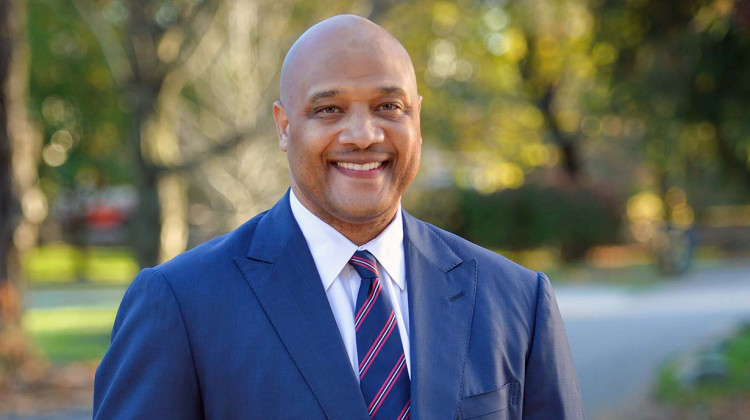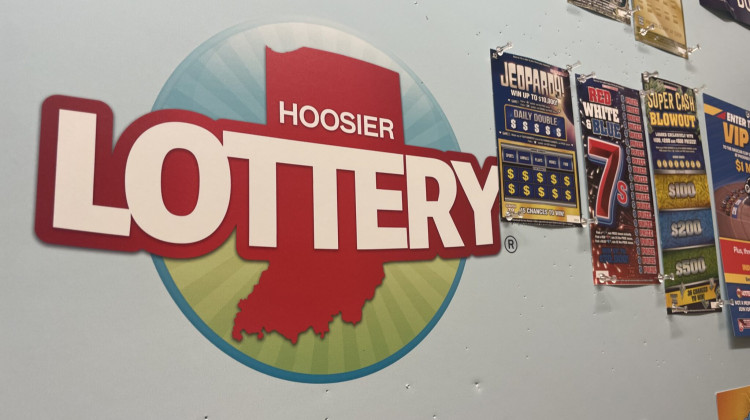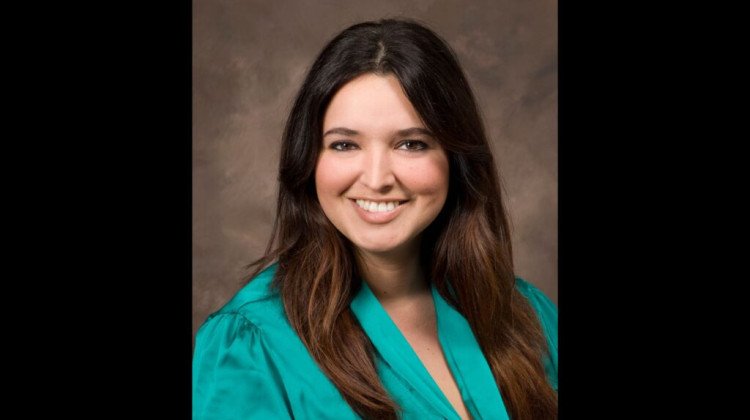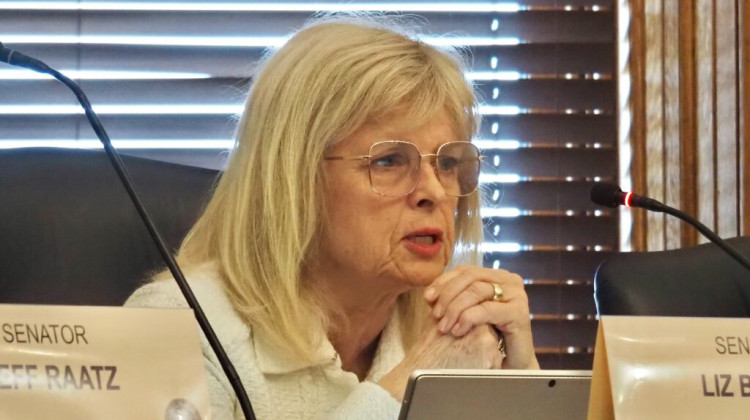
André Carson has served in the US House of Representatives since 2008 and was the first-ever Muslim to serve on the House Intelligence Committee.
Photo courtesy of André Carson’s campaignWFYI is speaking with U.S. House of Representatives candidates running for election in Central Indiana.
André Carson is the Democratic incumbent running for reelection in Indiana’s 7th Congressional District, which represents most of Indianapolis. He faces Republican John Schmitz and Libertarian Rusty Johnson.
Carson has served in the US House of Representatives since 2008 and was the first-ever Muslim to serve on the House Intelligence Committee.
Reporter Ben Thorp sat down with Carson to discuss why he wants to stay in office.
This transcript has been lightly edited for clarity and style. WFYI fact checks all candidate interviews and provides editor’s notes in the audio and digital publications.
Ben Thorp: Yeah. So I want to start by asking you, you know, why are you running for reelection, and why is this important to you?
André Carson: Well, it's important to me. I certainly take my job very seriously. I go to work along with our team with a sense of mission and purpose. We've been able to bring back so much to the district, hundreds of millions of dollars for economic development, drug treatment programs, infrastructure, roads, bridges, local hospitals, local NGOs, and nonprofits. And it's a passion, you know. Much of our work is casework and writing laws. And you know this is about public service, and it's really about doing the work of social work. And I think that with Democrats in the House, under the leadership of President Biden and Vice President Harris, we've made monumental accomplishments.
We got our economy back on the right track after the devastation of COVID-19, and we created almost 16 million jobs, new jobs, replacing the jobs that were lost during the pandemic. And then, we passed the Inflation Reduction Act, which effectively lowered the deficit.* They created a new clean energy economy, and it lowered the prescription cost of prescription drugs. We even capped the price of insulin at $35 a month for those on Medicare, which many thought was impossible. We passed the PAC Act, which is set to deliver millions of veteran benefits that they previously weren't eligible for.
*Editor’s note: Recent updates from the Congressional Budget Office indicate that the Inflation Reduction Act could add slightly to the deficit from 2022 to 2031. Biden officials have contended the law still reduces the deficit overall.
We passed the Chips and Science Act, which is already delivering for Hoosiers. Just last month, we announced that the Heartland Bioworks will receive a million dollars* thanks to this bill, it's opened up our state for new opportunities, innovation, and jobs, and we passed a bipartisan infrastructure law to replace our aging infrastructure at historic levels. It's funding - we've seen developments of IndyGo and the blue line.
It's funding road improvements from 38th Street, I was just there yesterday, to I-70. It's going to include 16 intersection improvements, two new traffic signals and 12 signal modifications, 49 lane miles of resurfacing, roughly about two miles of multi-use pass, and more than 300 curb ramp improvements. It's going to include about 3.5 miles of sidewalk improvements and about just over five lane miles of bike lane resurfacing. It's a job creator, and we've done it all without raising taxes for average middle-class Hoosiers, by making the ultra-wealthy pay the same amount in taxes as everyone else. So we've done a lot. We want to do more.
*Editor’s note: In July of this year Heartland Bioworks was actually awarded $51 million, not $1 million, as part of the CHIPS and Science Act of 2022.
Thorp: What to you are the most pressing issues heading into 2024 you know, the 2024 election?
Carson: Yeah, I think economic development is critically important. We certainly want to make sure that our schools are funded. We want to make sure that there's equity across the board, and that schools and urban centers have the same resources as wonderful schools in rural counties. Also, we want to make sure that we're funding local nonprofits and NGOs who are doing the work that government doesn't have the capacity to do.
And we have a lot of great NGOs, we've been able to bring back grant funding to help them. We also just hosted a very successful job fair. We do it annually, and a lot of people were hired on the spot. About 30% of the companies that were there hired ex-offenders.* And really my focus on the Transportation Committee, because Indianapolis is the crossroads of America, has been to increase funding for our transportation systems - sky, rail, and traditional roads and bridges.
We have tens of thousands of roads and bridges that must be repaved and resurfaced and, quite frankly, rebuilt, which are job creators. And my ultimate goal in the committee is to see a high-speed rail system from Chicago to Indy to St Louis and even to Kentucky, that will not only produce an increase in ridership, but it's going to really help with commerce and tourism in our state. And you know my passion is something I lose sleep over. You know, my work on the Intelligence Committee - having been a law enforcement officer and having been in the other Departments of Homeland Security, counterterrorism, and counterintelligence - is to make sure our country is safe, make sure that we are eliminating any internal threats, and making sure that we are resolving, ultimately, the crisis in the Middle East.
The Israeli Palestinian question, which has been a point of contention. It's been a terrorist recruitment tool. It's been a source of division and political chaos for decades now, and we're seeing this issue emerge in our elections, it has to be resolved. We need a commitment to a permanent ceasefire so we can get to the business of establishing a proper Palestinian state, so we can bring peace in the region, so we can move forward as one humanity.
* Editor’s note: After the interview, the Carson campaign supplied a map of the job fair that showed 60% of companies in attendance would hire ex-felons, not 30%.
Thorp: Indiana faces questions about the future of its healthy Indiana plan, now that a federal judge has struck down things like premiums as violating federal law, how do you think the state should proceed on its Medicaid expansion?
Carson: Well, I think it's critically important. I mean, if you look at the wealth of our country alone, and a lot of the federal dollars go to the States to address health care, amongst other needs, I would like to see an expansive system where we aren't debating these issues. I think that in the wealthiest nation in the world, we should be able to provide our citizens with free if not affordable, health care, and it's something that other countries have done quite well. Some people say, ‘Well, how are you going to pay for it?’
You could raise taxes, or we could look at perhaps adopting a European-style value-added tax to pay for it. I mean, the question is - who's going to pay for it? So I think that Governor Holcomb has made some good strides in terms of Medicare. We've worked together on many things. I think his heart is in the right place, but those of us who are advocates would like to see more get done.
Those in my caucus and the new dem caucus, I'm a progressive too, and others, my Republican buddies are always asking the pervasive question - who's going to pay for it? Ways in which we can collaborate effectively, to look at revenue streams and sources in which we can pay for it, I think our state could be a great model for other states to adopt, and ultimately for our countries to adopt, so we can get to the place where we can have free health care for all Americans.
Thorp: Congressman, you've been bringing up transportation a lot. Indianapolis is hoping to make use of some $140 million from the federal government for a new public transit bus line. That line came under scrutiny during the most recent legislative session, with lawmakers hoping to pause construction in a way that transit officials here said would essentially have killed the project. Do you have any perspective on how the city should be managing public transportation projects here in the city?
Carson: Well, you know, it's personal for me, because, you know, my work on the Transportation and Infrastructure Committee helped really shape the bipartisan infrastructure law, and we're going to see over $7 billion brought back to the state, having said that, it's quite disappointing. You know, representing Indianapolis, Indiana, to see my wonderful friends across the state try to invoke mandates that will dictate what happens in Indianapolis. It's disappointing. But you know, we don't work this hard to bring money back to not see it put to good use.
We know that Indiana and Indianapolis, unfortunately, is a leader in our country in terms of food deserts. And so we have folks from indigent populations. We have folks who don't have the resources and means to get access to a proper grocery store, and in some cases, they have to either go to truck stops or go to gas stations or food Marts, and we know the markup is double, if not triple, the options aren't very healthy if they are already spoiled.
And so having these bus lines, bus rapid transit allows citizens, particularly in Indianapolis and the greater Indianapolis area, ultimately, to access proper grocery stores and community health centers and regional health centers to get the food that they need, but also get access to the health care that they need to maintain and develop a healthy lifestyle.
Thorp: I wanted to get your perspective. You brought up the Chips Act, and Indiana here has invested heavily in semiconductor manufacturing, largely through the Chips Act. Give us your perspective on how Indiana is positioned in the global market, particularly when it comes to China.
Carson: Yeah, that's it. That's a phenomenal question. You know, we have a growing biotech sector here. I brag about it all the time, especially to my friends who represent Austin and my friends on the West Coast. I think it's critically important again, given my work on the House Intelligence Committee.
Also, I'm a member of the Select Committee on China and the CRP, and I think that we still have a big fight on our hands to go up against China in particular, who not only is a leader in the manufacturing of chips, but they effectively, in many ways, have a monopoly on the supply chain. Which means that our national security is at risk and jeopardized. So being a Hoosier, a proud Hoosier, being someone who sits on the committees of jurisdiction, the House Intelligence Committee, as well as the China committee, [it] gives me comfort in knowing that these chips will be manufactured and produced not only on US soil but in the great Hoosier state. So it reduces any impact that it could have.
You know, I've met with the FBI, I met with the governor's office and the mayor's office, as well as state police and local police - about monitoring foreign entities that are attempting to buy up land in states like Indiana to effectively set up beachheads for not only espionage but also in terms of influencing and interrupting our electronic devices and things like that.
Thorp: Yeah, I wanted your perspective on, you know, homelessness has been increasing in this district much as it has across the country. How can cities better invest in federal resources to manage housing and homelessness?
Carson: Well, it's a great question. I mean, it's a personal issue for me, my mother, who was my best friend. I was raised by my grandmother, but my mother and I spent a brief stint in a shelter, and that experience…was a defining moment for me, even as a kid. I don't think we can arrest our way out of this situation. I think that we have to have a proper relationship with the federal government and those who represent our taxpayer dollars, as members of Congress and members of the Senate, to bring back resources to states and local municipalities to use those resources to work in conjunction with NGOs and nonprofits who are doing the work on the ground to help develop housing, to help with drug treatment programs, to help with job placement programs, and to help with programs that will provide wraparound services.
I also used to work at the Center Township Trustee's Office, and I was a part of the man-to-man program led by the late Reverend Doctor William Hanna. And we used to go out at nine under the bridges and provide blankets for our homeless population or unhoused population. I think those things have to be done, but it has to be done in a way that is collaborative. No person should attempt to undertake this effort. No one organization can attempt to undertake this effort. Local government can't do it alone again, because they're stretched thinly.
So, it's a collaborative community process that should allow for experts on the ground who are leading NGOs and nonprofits to address this issue, but they need the resources and capacity. And look, we know a significant number of our unhoused population suffers from addiction issues and mental health issues. There are varying issues with not being able to connect with families or domestic violence and so many other issues. So we have to provide resources to address these issues in a way that will help make people become whole.
Thorp: Last question, can you tell us who you're backing for Indiana governor and US president in the upcoming election?
Carson: Well, I'm supporting the Democratic ticket. I'm endorsing another woman, Cormac. I think she's great. I think she'll do good. I think she understands our state. She will appeal to not only urban centers but also rural voters, many of whom I had contact with when I worked for the state excise police. I sat on over 22 county local alcohol and tobacco boards, and I met some people who have assaulted the Earth from Boone County all the way to Marshall County, Vermillion County, Carroll, and Cass County. I think she understands those wonderful communities. [They are] just some good Hoosiers and they're concerned.
I think our methodologies may vary, and our strategy may vary, but our end goal is the same. We want jobs. We want safer communities, and we. Want a healthy way of life, and I think in a way that an executive like the governor can implement those things and work with a general assembly to get it done. I'm all for it, and I think she's the person for the job.
Thorp: Congressman, that's all I have. As far as questions, is there anything I didn't ask you that you think is important for voters to know?
Carson: Thanks for having us. Carson for Congress.
 DONATE
DONATE






 Support WFYI. We can't do it without you.
Support WFYI. We can't do it without you.